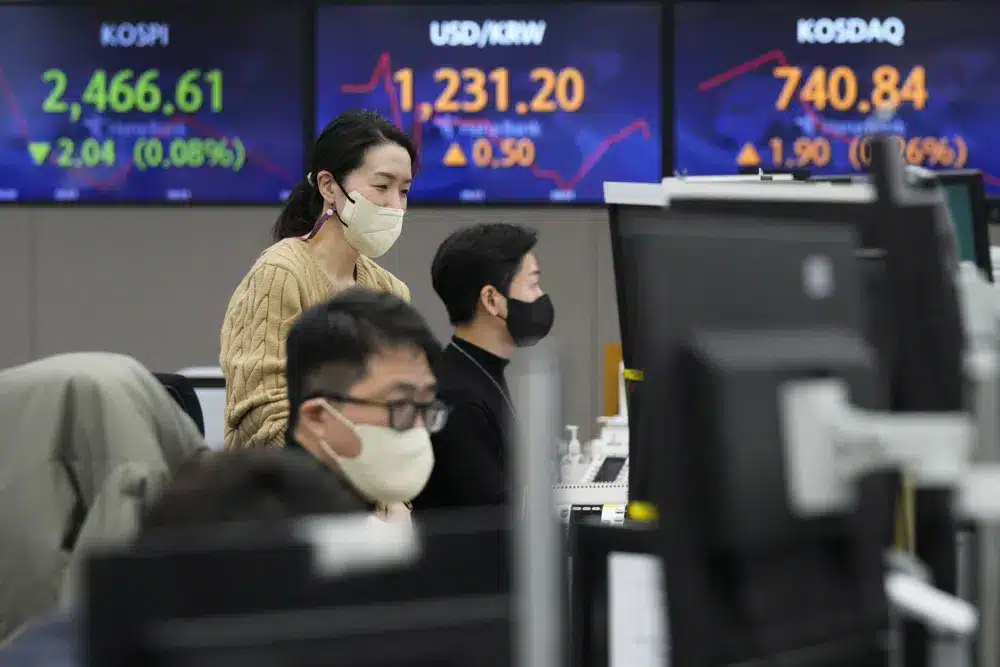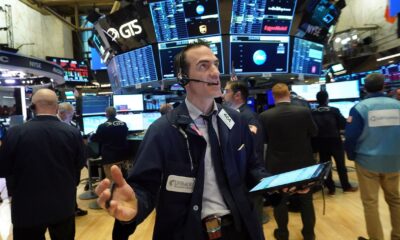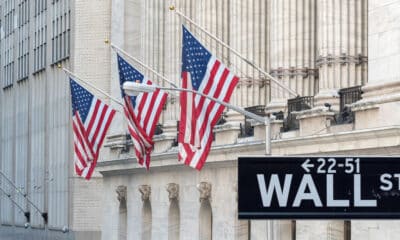Finance
WALL STREET: Asian Shares Edge Higher, Tracking Wall Street Rally

TOKYO, Japan — Asian stocks rose Friday, tracking a Wall Street rally fueled by reports that the economy and corporate profits may be doing better than expected.
In Tokyo, the core consumer price index rose 4.3%, slightly higher than the 4.2% expected and higher than the Bank of Japan’s 2% target.
“This seeks to challenge the central bank’s eventual policy shift, though the government’s energy subsidies next month could be used to delay any changes for the time being,” said Yeap Jun Rong, a market analyst at I.G., in a commentary.
The Nikkei 225 index in Japan rose nearly 0.1% in morning trading to 27,380.11. The S&P/ASX 200 index in Australia rose 0.5% to 7,503.50. The Kospi in South Korea rose 1.2% to 2,497.05. The Hang Seng Index in Hong Kong was unchanged at 22,571.58.
Shanghai’s markets remained closed for the Lunar New Year holiday.
Wall Street stocks went up to their highest level in almost eight weeks after the Commerce Department said that the U.S. economy grew at a 2.9% annual rate in the fourth quarter. This suggests that the economy will still be growing at the end of 2022, even though interest rates are going up and many people are worried about a recession. This exceeded economists’ expectations of a 2.3% increase.
Wall Street Getting A lot Of Earnings And Economic Reports
The S&P 500 rose 1.1% to 4,060.43, its highest finish since December 2. The Dow rose 0.6% to 33,949.41, while the Nasdaq rose 1.8% to 11,512.41.
Wall Street is getting a lot of earnings and economic reports, which could lead to more volatility. Markets have recently swung up and down as fears of a severe recession and a drop in profits compete with hopes that the economy can manage a soft landing and that the Federal Reserve will lower interest rates.
Other information On Thursday, factory orders for durable goods went up more than expected in December, and less people than expected applied for unemployment benefits the week before.
Strong data show that the economy can handle the Fed’s avalanche of rate hikes last year and at least one more expected next week without crashing into a deep recession. Higher interest rates are designed to slow the economy by making it more expensive to borrow money to buy a house, a car, or anything else on credit. They also cause stock and other investment prices to fall.
But if the economy is stronger than expected, especially in the job market, the Fed may have to keep rates high for longer to make sure inflation is really crushed. The Fed has repeatedly stated that it intends to do so until the end of the year, though many investors do not appear to believe it.
The Report Shows Good News
The 10-year Treasury yield, which helps set rates for mortgages and other important loans for the economy, increased to 3.49% from 3.45% late Wednesday. The two-year yield, which tends to track expectations for Fed interest rate actions more closely, increased to 4.18% from 4.13%.
At first glance, Thursday’s economic report seemed to be good news. However, it also showed some worrying signs of a slowdown. According to Megan Horneman, chief investment officer at Verdence Capital Advisors, it is also backward-looking.
“The first half of this year is going to be tough,” she predicted, citing recent weakness in the economy’s manufacturing and services sectors.
On the earnings front, news from some big tech companies gave people more reason to be optimistic a day after Microsoft’s forecasts made people worry.
Tesla went up 11% after the company that makes electric cars said that its profit for the last quarter was higher than expected. Seagate Technology rose 10.9% after reporting higher-than-expected revenue and earnings.
Steelmaker Nucor was also among the top-performing stocks in the S&P 500, rising 8.4% after exceeding profit and revenue forecasts by Wall Street.
Sherwin Williams Was On The Wrong Side Of Wall Street
Chevron rose 4.9% after raising its dividend and approving a stock repurchase program worth up to $75 billion. Both moves put money directly into shareholders’ pockets, which drew criticism from Washington. Instead, according to White House spokesman Abdullah Hasan, oil companies should “use their record profits to increase supply.”
Sherwin Williams was on the wrong side of Wall Street. It fell 8.9% after reporting lower-than-expected revenue for the most recent quarter. It also provided a profit forecast for the coming year that fell far short of analysts‘ expectations, as a weak housing market weighs on demand for paint.
Despite reporting profit and revenue that met Wall Street’s expectations, IBM fell 4.5%. Analysts pointed to some lower-than-expected numbers in terms of cash generation.
Southwest Airlines lost more money than expected in its most recent quarter, which was hurt by the fact that more than 16,700 flights had to be canceled last month. It also stated that it expects to lose money in the first three months of 2023.
On the New York Mercantile Exchange, benchmark U.S. crude rose 21 cents to $81.22 per barrel in electronic trading. On Thursday, it fell 14 cents to $81.01.
Brent crude, the international benchmark, rose 17 cents to $87.64 per barrel in London.
The U.S. dollar fell to 129.83 Japanese yen from 130.23 yen in currency trading. The euro is now worth $1.0877, down from $1.0890.
SOURCE – (AP)
Finance
Forex Trading Gains Popularity in Thailand

Forex Trading, the buying and selling of currencies has long been considered a game played by a handful of countries with strong financial stability and stronger currencies, such as the United Kingdom, the United States, the UAE, and even Singapore. However, recent reports have painted a very different picture: most forex search acts use the world’s smaller economies.
While this doesn’t mean that they are engaging in forex trading, it does mean that the interest is there and with a little fostering and some education, the forex economy would bloom. Such is the case with Thailand.
Attempting to gain financial independence through forex
As a country with cheap labor and few job opportunities, forex trading is gaining widespread attention as natives gain more insights into the world of forex via social media and the Internet. There are countless TikTok videos on how to become financially independent through trading, specifically forex trading, and these unconventional—but previously inaccessible—ways of making money are generating lots of interest, especially with the younger generation.
The Internet creates accessibility for Thai nationals interested in forex.
Without the rise of smartphones and data plans, forex might not have reached such levels of interest in Thailand. Aside from how information regarding trading opportunities is peddled through social media, the Internet has also created a platform for accessible trading. Thai nationals are able to source international brokers and global platforms instead of relying on national institutions that do not offer support for forex trading.
Thatn’t I forex supported in Thailand?
National institutions don’t support Forex trading in Thailand that don’t support Forex trading in Thailand. There are currency restrictions. In 1977, during the Tom Yum Kung crisis, the country’s mismanagement of the Thai baht caused a withdrawal of foreign investments due to trade deficits.
However, hope is not all lost. As mentioned above, social media is a means for local residents to learn more about their options and finding a reputable โบรกเกอร์ forex broker is by no means impossible. In fact, as long as users steer clear of pyramid schemes, they are eligible to register an account with a foreign currency broker outside of the country, and it is all very legal.
The Future of Forex Trading in Thailand
Recent reports reveal that the Thai government has plans to relax laws on forex trading. According to Chananun Supadulya, the BoT’s Foreign Exchange Administration and Policy Department director, the annual outflow limit will be raised from US$50,000 to US$200,000. This shows promise that Thailand will benefit further from forex, and the economy will boom with the right regulations in place.
Related News:
Bitcoin Goes Over $80,000
Bitcoin Goes Over $80,000 As Buyers Guess Whether Trump Will Run For President.
Finance
Common Pitfalls to Avoid in Future and Option Trading

Options Trading involves buying and selling financial instruments such as stocks, bonds, or commodities to profit from price fluctuations. Understanding common mistakes in this area is crucial to avoid significant financial losses. Hence, seamless trading is essential for maximizing profits and minimizing risks.
Many traders fall into similar traps, leading to preventable errors that could have been avoided with the proper knowledge. This article outlines critical future and options trading pitfalls and provides strategies to prevent them. By reading this, you will be better equipped to navigate the complexities of the market and achieve tremendous trading success.
Overleveraging: A Double-Edged Sword
Overleveraging is a common pitfall that can lead to catastrophic results if the market moves against your position. However, one of the most enticing aspects of such trading is the ability to use leverage. It allows you to control a more prominent position with relatively little capital, potentially amplifying your profits.
This double-edged sword can just as quickly magnify your losses. Many traders get caught up in the allure of potential profits and forget that the same leverage that can boost gains can also wipe out an account in minutes. Setting strict leverage limits and using risk management tools like stop-loss orders can help mitigate this risk.
Ignoring Market Volatility When Trading: A Risky Oversight
Volatility measures market uncertainty, and understanding it can be the difference between profit and loss. Ignoring or underestimating market volatility is a pitfall that can lead to unexpected and often severe losses. The value of options, in particular, is susceptible to changes in volatility, making it crucial for traders to understand and anticipate market swings.
To navigate this effectively, traders should regularly monitor market conditions and use volatility indicators to inform their strategies. Adapting your trading approach to different volatility environments can help you capitalize on opportunities while minimizing risks.
Failing to Diversify: Do not Put All Your Eggs in One Basket
Diversification is fundamental in any investment strategy, yet it is often overlooked in futures and options trading. Focusing too heavily on a single asset or market can expose you to unnecessary risk.
A well-diversified portfolio significantly reduces the impact of poor-performing investments and helps maintain stability; a sudden adverse movement in one sector can lead to a substantial loss if your portfolio is not diversified.
To avoid this pitfall, ensure your trading strategy includes a variety of assets and sectors. Whether you are trading commodities, indices, or equities, spreading your investments can buffer against market volatility and enhance your overall portfolio stability.
Neglecting Continuous Education: Knowledge is Power
One of the biggest mistakes traders make is neglecting continuous education. Future and options trading is complex, and staying informed about contemporary trends, strategies, and market news is crucial for success. Ongoing learning ensures that you remain adaptable and prepared for any market conditions.
Investing time in education can significantly improve your trading performance. Attend seminars, read books, follow market analysts, and consider taking courses on advanced trading strategies. The more you know, the better equipped you will be to navigate the complexities of trading.
Seamless futures and options trading enhance financial freedom by ensuring smoother transactions, reducing risks, and maximizing profits. By mastering futures and options trade techniques, you can make informed decisions that lead to financial stability.
To achieve your financial goals, you must acknowledge and rectify the abovementioned mistakes. With the appropriate approach, you can navigate the world of trading precisely. So, stay informed and trade wisely.
Finance
Crypto And Meme Stock Boosters Aren’t Doing ‘Trump Trades’ — They’re Just Doing Trades

Bitcoin bulls and meme stock traders are excited about the prospect of another Donald Trump presidency. Or at least the possibility of conducting some momentum trading in the next 18 days.
Here is the deal: Bitcoin, the world’s largest cryptocurrency, surged briefly to a three-month high above $68,000 on Wednesday, fueled by a combination of signals, including the former president’s statement on X that “crypto is the future” and Vice President Kamala Harris’ nod Monday to regulatory support for digital assets.
At the same time, Trump Media shares were recovering from Tuesday’s inexplicable 10% dip and resumed their meme-stock-like trend of rising without any fundamental cause to do so. The stock closed Wednesday up more than 15%.
Crypto And Meme Stock Boosters Aren’t Doing ‘Trump Trades’ — They’re Just Doing Trades
What do digital currencies and media stocks have in common?
Not much generally. However, in recent weeks, they appear to have shifted in tandem with traders’ estimates of Trump’s reelection chances.
To be clear, these traders do not have a crystal ball; they are simply wagering, with varied degrees of skill, on highly volatile assets.
Crypto traders are ecstatic at the Republican nominee’s apparent 180 on an asset class he previously branded as a fraud. Even if Tuesday’s launch of Trump-backed cryptocurrency platform World Liberty Financial revealed lukewarm interest and numerous technical issues, the former president has spent months recruiting industry billionaires and generally telling devotees what they want to hear.
That enthusiasm skyrocketed Wednesday when Trump extended his lead over Harris on Polymarket, a cryptocurrency-focused predictions website where you can wager on the election outcome. According to those investors, Trump has a 59% probability against Harris’ 41%. (This is drastically out of line with national polls, including CNN’s “Poll of Polls,” which currently show a near tie.)
“As the election approaches, voting estimates may cause market swings,” says Robinhood’s senior director of investment strategy, Steph Guild. Bitcoin may gain from Trump’s improved odds, she said, “given that he is seen as more friendly to crypto in general.”
Aside from the election prediction game, Adrian Fritz, global head of research for crypto business 21shares, tells me that bitcoin, a bellwether for the broader crypto market, is being propelled by other macro tailwinds. Not least, central banks around the world are lowering interest rates, making risky assets such as cryptocurrency more appealing. Plus, it’s #Uptober, a month when digital assets have historically performed well.
“It’s no surprise that it became way more political on both sides,” Fritz points out. “The positive aspect is that it draws attention to the entire space…” We firmly believe that, regardless of who wins, the outcome will be beneficial to the industry.
According to Barron’s journalist Al Root, the equivalent of all DJT shares available for sale has changed hands multiple times in the last week, with investors hanging onto the stock for an average of only two days. For instance, Root observes that Apple shares take more than a year to fully turn over.
Crypto And Meme Stock Boosters Aren’t Doing ‘Trump Trades’ — They’re Just Doing Trades
That level of volatility makes cryptocurrency appear stable in comparison, but it attracts a certain type of iron-stomach trader looking to purchase on the rise and sell before it peaks. (Sounds simple, but your investment adviser might tell you you’d be better off going to a casino, where you could have a great cocktail and enjoy playing cards while losing money.)
Fritz thinks that momentum plays are “absolutely” happening. “This affects both consumers and professional investors. “The basis trade is one of the most popular bitcoin strategies,” he stated.
(In other words, hedge funds are leveraging up to execute complicated trades that take advantage of slight price variations between bitcoin’s spot price and futures market pricing, increasing trading volume even further.)
Bottom line: Bitcoin and Trump Media may get considerably more volatile in the coming weeks as more traders enter the market. However, if analysts or voters are looking to the market for clues as to how this presidential election will play out, keep in mind that traders will trade. While some sincere believers may be investing in supposedly pro-Trump assets, the great majority are simply working the casino floor, hoping to cover their bets and gain a few bucks.
SOURCE | AP
-
Tech4 weeks ago
Apple Unveiled A Fresh Glimpse Of Their AI Featuring ChatGPT Integration.
-
Business4 weeks ago
Costco Is Offering The Peloton Bike+ At 300 Locations This Holiday Season.
-
News4 weeks ago
Boeing Reports $6 Billion Quarterly Loss As Striking Workers Vote Whether To Accept Contract Offer
-
News4 weeks ago
The FBI Looks At Claimed Leaks Of Sensitive Israel Attack Records.
-
News4 weeks ago
‘Malcolm In The Middle’ Star Frankie Muniz Lands Full-Time NASCAR Ride In 2025
-
Business4 weeks ago
The Volkswagen China CMO Faced Expulsion From China Due To Drug Use.






























